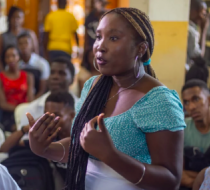Abortion Access & Gender-Based Violence in Haiti Favorite
Haiti is a conservative society where Roman Catholicism shapes many of its social norms. Patriarchal norms, says Haitian feminist Pascale Solages, co-founder and general coordinator of feminist organization Nègès Mawon, have informed its strict views on abortion. In Haiti, women can’t legally access voluntary abortions. Doctors can’t perform them unless the woman’s life is in danger. People who seek, provide, or assist abortions face significant legal consequences—seekers and helpers can serve life in prison. Women who undergo abortion also risk ostracization from their communities. For women and girls who aren’t ready to have children, can’t afford to have them, or are pregnant by rape—Haiti’s justice system treats pregnancies caused by rape and incest in the same way as pregnancies resulting from consensual relationships—abortion can mean life in prison.
Since 2015, Solages’ organization, Nègès Mawon, has helped empower women in Haiti to fight back against violence and oppression through education and advocacy. Last year, Nègès Mawon announced a partnership with the Safe Abortion Action Fund, or SAAF, a global funding body that helps organizations in low- and middle-income countries advocate for safe abortion care. One of the ways it does this is through its sponsorship program, Marrainage, or Sisterhood, through which the organization pairs women, many of whom are survivors of gender-based violence, with other survivors to help them reclaim their histories and turn them into tools of resistance against patriarchal systems. The program is multidimensional, and helps women escape circles of violence. Depending on their circumstances, women who seek out Nègès Mawon are assigned une marraine, or a sister, to accompany them to appointments with medical, legal, or psychology experts within Nègès Mawon’s network of specialists. They can help them move out of dangerous areas controlled by gangs, for example. They function as “sponsors,” if you will.
Marraines are available 24 hours a day, seven days a week. If a woman needs help processing a rape, her marraine can accompany her to a therapy appointment. If a woman is experiencing medical complications from trying to abort her own pregnancy, she can ask her marraine to accompany her to a clinic for aftercare. Since last May, Nègès Mawon has supported more than 300 survivors of gender-based violence through the Marrainage program. Core to its mission is offering services that aren’t only safe, says Solages, but affordable. With the support of partner organizations, like Médecins Sans Frontières or Bureau des Droits Humaines en Haïti, it can subsidize the cost of services or offer them for free.
Outside of its Marrainage program, Nègès Mawon cites art as one of the primary media through which it advocates for women. Last year, in collaboration with local artists, the organization debuted a theatrical play called Danta, which tells the story of a woman mourning the death of her daughter, Danta, who dies after an unsafe abortion. The play, written by Nègès Mawon member Joanne Joseph, took three years to write and produce. It opened at the organization’s annual Festival Féministe.“It’s a play that’s really intense, that brings a lot of emotion and a lot of pain for women,” says Solages. “Last year, about 100 people saw it. This year, we hope to reach thousands more.” Danta is currently on a two-year tour across the country, where it will reach universities, rural areas, feminist groups, and vulnerable communities. Every performance of Danta engages spectators in conversations about abortion, the right to choose, and other topics covered in the play. Solages says she hopes the tour will save lives by educating people about sexuality, safe abortion, and gender-based violence. To make the play’s content more impactful, Nègès Mawon has enlisted the help of a midwife to help transform it from a piece of performance art into a powerful educational experience.
“Before, it was just a play,” says Solages. “Now, it’s still a play, but it’s also a tool for sensitizing and educating. … It’s a way to give good information about safe abortion, about accessible abortion, and to tell the communities, ‘We’re here. If you need us, we’re here.’” Years after her first abortion in Port-au-Prince, Chalmers had a second abortion, this time with a medical professional at a private clinic whom her doctor had referred her to. It was $150, three times the cost of her first abortion. The doctor ran tests, had a nurse help Chalmers remain comfortable throughout the procedure, and kept her afterward for observation. This time, she felt safe. Today, Chalmers has a 4-year-old daughter, whom she had when she felt ready to bring a child into the world.
“Raising a child is not just giving it love,” she says. “You have to heal yourself first, from all your traumas, from all those expectations. … I wasn’t ready at all [back then], I think psychologically, I wasn’t ready, and financially also.”
Changing local perceptions of abortion and educating people about abortion access is half of the work. The other half is legalizing abortion. While Nègès Mawon hopes plays like Danta and tools like the Marrainage program will give women the information they need to exercise their agency, changes to the penal code—for which the organization also continues to advocate—are essential.
“It’s a fact that in countries where abortion is legal, there’s a radically lower death rate when it comes to abortions,” says Solages. “It’s a question of women’s lives, of their liberty, of their well-being. In Haiti, we’re not even there yet. We’re just trying to save as many women as possible.”








